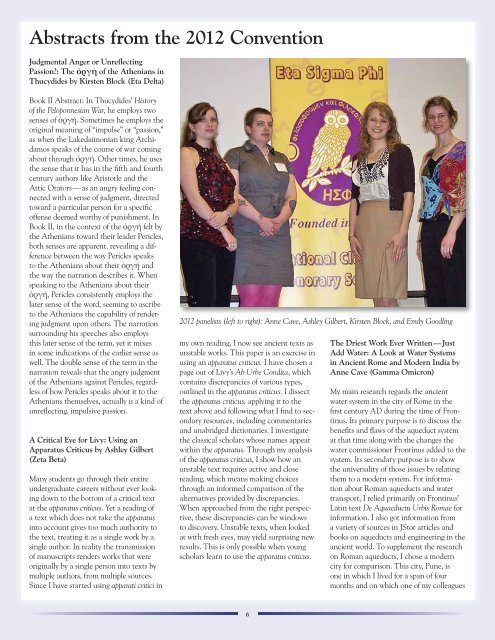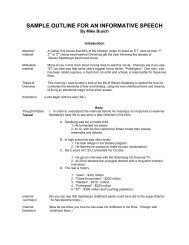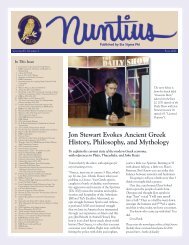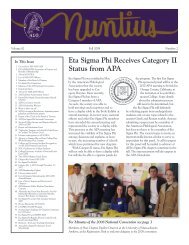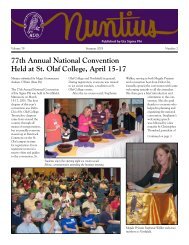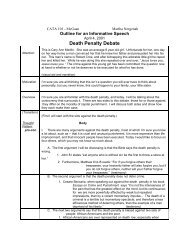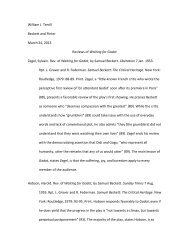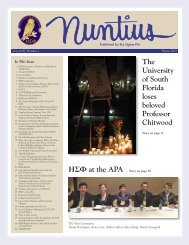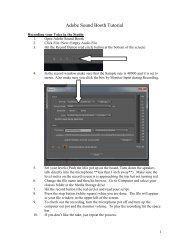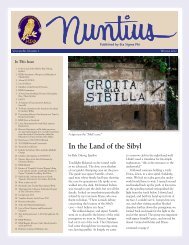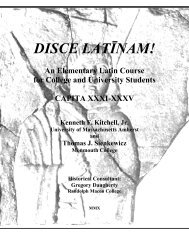Vol 86, No. 2 Fall 2012 - Monmouth College
Vol 86, No. 2 Fall 2012 - Monmouth College
Vol 86, No. 2 Fall 2012 - Monmouth College
You also want an ePaper? Increase the reach of your titles
YUMPU automatically turns print PDFs into web optimized ePapers that Google loves.
Abstracts from the <strong>2012</strong> Convention<br />
Judgmental Anger or Unreflecting<br />
Passion?: The ὀργή of the Athenians in<br />
Thucydides by Kirsten Block (Eta Delta)<br />
Book II Abstract: In Thucydides’ History<br />
of the Peloponnesian War, he employs two<br />
senses of ὀργή. Sometimes he employs the<br />
original meaning of “impulse” or “passion,”<br />
as when the Lakedaimonian king Archidamos<br />
speaks of the course of war coming<br />
about through ὀργή. Other times, he uses<br />
the sense that it has in the fifth and fourth<br />
century authors like Aristotle and the<br />
Attic Orators — as an angry feeling connected<br />
with a sense of judgment, directed<br />
toward a particular person for a specific<br />
offense deemed worthy of punishment. In<br />
Book II, in the context of the ὀργή felt by<br />
the Athenians toward their leader Pericles,<br />
both senses are apparent, revealing a difference<br />
between the way Pericles speaks<br />
to the Athenians about their ὀργή and<br />
the way the narration describes it. When<br />
speaking to the Athenians about their<br />
ὀργή, Pericles consistently employs the<br />
later sense of the word, seeming to ascribe<br />
to the Athenians the capability of rendering<br />
judgment upon others. The narration<br />
surrounding his speeches also employs<br />
this later sense of the term, yet it mixes<br />
in some indications of the earlier sense as<br />
well. The double sense of the term in the<br />
narration reveals that the angry judgment<br />
of the Athenians against Pericles, regardless<br />
of how Pericles speaks about it to the<br />
Athenians themselves, actually is a kind of<br />
unreflecting, impulsive passion.<br />
A Critical Eye for Livy: Using an<br />
Apparatus Criticus by Ashley Gilbert<br />
(Zeta Beta)<br />
Many students go through their entire<br />
undergraduate careers without ever looking<br />
down to the bottom of a critical text<br />
at the apparatus criticus. Yet a reading of<br />
a text which does not take the apparatus<br />
into account gives too much authority to<br />
the text, treating it as a single work by a<br />
single author. In reality the transmission<br />
of manuscripts renders works that were<br />
originally by a single person into texts by<br />
multiple authors, from multiple sources.<br />
Since I have started using apparati critici in<br />
<strong>2012</strong> panelists (left to right): Anne Cave, Ashley Gilbert, Kirsten Block, and Emily Goodling<br />
my own reading, I now see ancient texts as<br />
unstable works. This paper is an exercise in<br />
using an apparatus criticus. I have chosen a<br />
page out of Livy’s Ab Urbe Condita, which<br />
contains discrepancies of various types,<br />
outlined in the apparatus criticus. I dissect<br />
the apparatus criticus, applying it to the<br />
text above and following what I find to secondary<br />
resources, including commentaries<br />
and unabridged dictionaries. I investigate<br />
the classical scholars whose names appear<br />
within the apparatus. Through my analysis<br />
of the apparatus criticus, I show how an<br />
unstable text requires active and close<br />
reading, which means making choices<br />
through an informed comparison of the<br />
alternatives provided by discrepancies.<br />
When approached from the right perspective,<br />
these discrepancies can be windows<br />
to discovery. Unstable texts, when looked<br />
at with fresh eyes, may yield surprising new<br />
results. This is only possible when young<br />
scholars learn to use the apparatus criticus.<br />
The Driest Work Ever Written — Just<br />
Add Water: A Look at Water Systems<br />
in Ancient Rome and Modern India by<br />
Anne Cave (Gamma Omicron)<br />
My main research regards the ancient<br />
water system in the city of Rome in the<br />
first century AD during the time of Frontinus.<br />
Its primary purpose is to discuss the<br />
benefits and flaws of the aqueduct system<br />
at that time along with the changes the<br />
water commissioner Frontinus added to the<br />
system. Its secondary purpose is to show<br />
the universality of those issues by relating<br />
them to a modern system. For information<br />
about Roman aqueducts and water<br />
transport, I relied primarily on Frontinus’<br />
Latin text De Aquaeductu Urbis Romae for<br />
information. I also got information from<br />
a variety of sources in JStor articles and<br />
books on aqueducts and engineering in the<br />
ancient world. To supplement the research<br />
on Roman aqueducts, I chose a modern<br />
city for comparison. This city, Pune, is<br />
one in which I lived for a span of four<br />
months and on which one of my colleagues<br />
6


